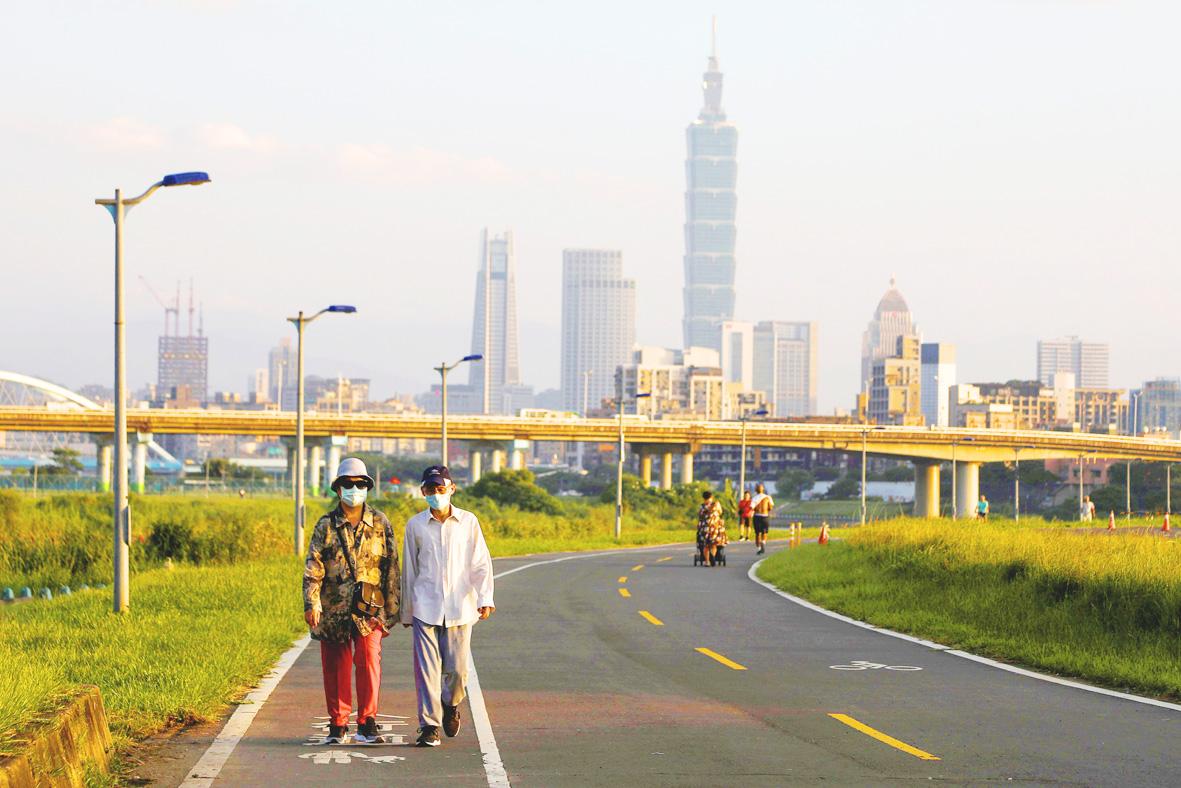Housing transactions last month soared from a year earlier, although the deals held steady compared with July’s, major property brokers said yesterday, attributing the results to real demand and low interest rates.
Last month’s showings came even though Ghost Month started on Aug. 19 and is to last through Sept. 16. Taiwanese tend to avoid buying properties during the annual lunar Ghost Month, which is considered inauspicious for completing real-estate transactions, business openings, getting married and many other activities.
Evertrust Rehouse Co (永慶房屋), the nation’s largest real-estate broker by the number of offices, said its tallies showed a 58 percent spike in property deals nationwide, as people regained confidence in the property market given that Taiwan appears to have the COVID-19 outbreak well under control.

Photo: Ann Wang, Reuters
“Real demand underpinned 60 to 70 percent of the deals,” Evertrust Rehouse spokesman Jay Hsieh (謝志傑) said, adding that investment and asset allocation needs also contributed 20 percent after staying on the sidelines for several years.
Record-low interest and ample liquidity probably accounted for the resurgence in interest, Hsieh said.
The COVID-19 pandemic has prompted central banks around the world to cut interest rates to ultra-low levels or negative territory to avert a credit crunch and support economic growth.
The strategy appeared to be effective in driving partial idle money from savings deposits to the property market, Hsieh said.
Sinyi Realty Inc (信義房屋), the nation’s sole listed broker, said it observed a 33 percent bounce in property transactions as of Sunday, bucking the slow seasonality.
People who might have decided to wait and see during Ghost Month in previous years turned active this year, Sinyi research manager Tseng Ching-der (曾進德) said.
Travel bans also lent support, as they allow Taiwanese to spend more time looking for houses rather than vacationing abroad, he said.
The improvement was most evident in Taipei, where property transactions rose 43 percent from a year earlier on the back of demand from first-time home buyers and people seeking to relocate, Sinyi’s statistics showed.
Apartments priced from the NT$10 million to NT$15 million (US$338,685 to US$508,027) as well as those in the NT$20 million to NT$30 million range are the most popular, Tseng said.
Chinatrust Real Estate Co (中信房屋) said its business held steady last month without the usual seasonal decline caused by Ghost Month, thanks to pent-up demand and low borrowing costs.
The absence of typhoons also helped shore up buying interest, it said.
Buying interest picked up about 20 percent last month from a year earlier, all three firms said, but added that the pandemic would remain a downside risk for the rest of this year.

MULTIFACETED: A task force has analyzed possible scenarios and created responses to assist domestic industries in dealing with US tariffs, the economics minister said The Executive Yuan is tomorrow to announce countermeasures to US President Donald Trump’s planned reciprocal tariffs, although the details of the plan would not be made public until Monday next week, Minister of Economic Affairs J.W. Kuo (郭智輝) said yesterday. The Cabinet established an economic and trade task force in November last year to deal with US trade and tariff related issues, Kuo told reporters outside the legislature in Taipei. The task force has been analyzing and evaluating all kinds of scenarios to identify suitable responses and determine how best to assist domestic industries in managing the effects of Trump’s tariffs, he

TIGHT-LIPPED: UMC said it had no merger plans at the moment, after Nikkei Asia reported that the firm and GlobalFoundries were considering restarting merger talks United Microelectronics Corp (UMC, 聯電), the world’s No. 4 contract chipmaker, yesterday launched a new US$5 billion 12-inch chip factory in Singapore as part of its latest effort to diversify its manufacturing footprint amid growing geopolitical risks. The new factory, adjacent to UMC’s existing Singapore fab in the Pasir Res Wafer Fab Park, is scheduled to enter volume production next year, utilizing mature 22-nanometer and 28-nanometer process technologies, UMC said in a statement. The company plans to invest US$5 billion during the first phase of the new fab, which would have an installed capacity of 30,000 12-inch wafers per month, it said. The

Taiwan’s official purchasing managers’ index (PMI) last month rose 0.2 percentage points to 54.2, in a second consecutive month of expansion, thanks to front-loading demand intended to avoid potential US tariff hikes, the Chung-Hua Institution for Economic Research (CIER, 中華經濟研究院) said yesterday. While short-term demand appeared robust, uncertainties rose due to US President Donald Trump’s unpredictable trade policy, CIER president Lien Hsien-ming (連賢明) told a news conference in Taipei. Taiwan’s economy this year would be characterized by high-level fluctuations and the volatility would be wilder than most expect, Lien said Demand for electronics, particularly semiconductors, continues to benefit from US technology giants’ effort

‘SWASTICAR’: Tesla CEO Elon Musk’s close association with Donald Trump has prompted opponents to brand him a ‘Nazi’ and resulted in a dramatic drop in sales Demonstrators descended on Tesla Inc dealerships across the US, and in Europe and Canada on Saturday to protest company chief Elon Musk, who has amassed extraordinary power as a top adviser to US President Donald Trump. Waving signs with messages such as “Musk is stealing our money” and “Reclaim our country,” the protests largely took place peacefully following fiery episodes of vandalism on Tesla vehicles, dealerships and other facilities in recent weeks that US officials have denounced as terrorism. Hundreds rallied on Saturday outside the Tesla dealership in Manhattan. Some blasted Musk, the world’s richest man, while others demanded the shuttering of his